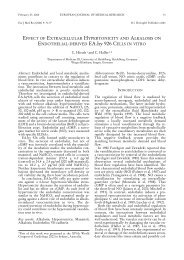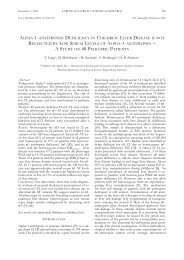European Journal of Medical Research - Deutsche AIDS ...
European Journal of Medical Research - Deutsche AIDS ...
European Journal of Medical Research - Deutsche AIDS ...
Create successful ePaper yourself
Turn your PDF publications into a flip-book with our unique Google optimized e-Paper software.
June 27, 2007 EUROPEAN JOURNAL OF MEDICAL RESEARCH<br />
37<br />
A.29 (Poster)<br />
BORDERNET- cross border cooperation in<br />
HIV/<strong>AIDS</strong> and STI prevention, diagnostic and<br />
therapy<br />
Steffan E. 1 , Arsova-Netzelmann T. 1<br />
1 SPI Forschung gGmbH, Berlin, Germany<br />
Objectives: BORDERNET aims to enhance HIV/<strong>AIDS</strong> and<br />
STI-Prevention, diagnostic and therapy in regions across the<br />
old and the current EC-outer borders, funded by the EU,<br />
MOH Germany etc. BORDERNET takes into consideration<br />
the specific differences in cultural, legal and social aspects<br />
and the regional distinctions <strong>of</strong> border regions. The project<br />
operates in four cross-border model regions, connecting Germany<br />
and Poland, Austria and the Slovak Republic, Italy and<br />
Slovenia.<br />
Methods: The project addresses relevant agents in the field <strong>of</strong><br />
HIV and STI prevention, diagnostic and therapy. The cooperation<br />
is based on regional interdisciplinary networks to<br />
strengthen capacity building, prevention measures, collection<br />
<strong>of</strong> epidemiological data, improvement <strong>of</strong> STI diagnostic and<br />
counselling <strong>of</strong>fers and carry out <strong>of</strong> KAB surveys outlining<br />
sexual risk indicators and prevention potentials among special<br />
target groups.<br />
Results: Cross-border networks create synergy effects beyond<br />
the concerned regions. In the KAB-Surveys around 1700<br />
persons from 6 countries were questioned. The results delivered<br />
insights into the specific risk related contexts regarding<br />
mobility, sexual risk behavior, access and utilisation <strong>of</strong><br />
HIV/STI services. The Sentinel Surveillance on STI provides<br />
important knowledge about the state <strong>of</strong> diagnostic <strong>of</strong>fers and<br />
the epidemiological development in the model regions. In order<br />
to improve services’ accessibility and quality, additional<br />
pilot diagnostic <strong>of</strong>fers especially for hard to reach groups and<br />
uninsured persons were established.<br />
Discussion: In all the model regions a necessary integration<br />
or at least a harmonisation <strong>of</strong> the existing HIV/<strong>AIDS</strong> prevention<br />
and diagnostic <strong>of</strong>fers on the one side and the STI <strong>of</strong>fers<br />
on the other should be attempted out <strong>of</strong> efficiency reasons.<br />
The integration <strong>of</strong> STI into a holistic concept <strong>of</strong> “Sexual<br />
Health” is <strong>of</strong> particular importance in the whole <strong>of</strong> Europe,<br />
especially for (young) women. The considerable deficiencies<br />
in STI diagnostic in all the participating model regions lead to<br />
an under-registration <strong>of</strong> STI. The assessed approaches in HIV<br />
Voluntary Counselling and Testing (VCT) highlighted some<br />
quality discrepancies and should be improved through the introduction<br />
<strong>of</strong> uniform VCT quality standards.<br />
A.30 (Poster)<br />
"Love knows no boundaries": a project by<br />
migrants for migrants in the prevention <strong>of</strong> sexually<br />
transmitted diseases (STD)<br />
Traub U. 1 , Körber J. 2 , Schmolz G. 3<br />
1 County Health Department, Ludwigsburg, Germany, 2 State<br />
Health Department, Stuttgart, Germany, 3 currently State<br />
Health Department, Stuttgart, Germany<br />
The incidence <strong>of</strong> STD is increasing amongst young migrants.<br />
Informative media in their own language that appeal to migrants<br />
is scarce in Germany.<br />
Objective: To increase awareness about STD in school children<br />
and young adults from Turkey and Russia.<br />
Methods: A physician from the Health Department trained<br />
pupils from two schools using several self-developed, interactive<br />
games. Turkish and Russian pupils developed media for<br />
use in migrant populations.<br />
Results: Six posters and flyers dealing with different STDs<br />
were designed and printed in Russian. Language and pictures<br />
were selected by pupils for their own age group. A Turkish<br />
DVD featuring pupils and a representative from the Turkish<br />
consulate was produced. There are short sequences on<br />
Chlamydia, Herpes, Hepatitis etc based on day-to-day situations<br />
at school.The media were distributed to over 100<br />
schools and youth centres all over Germany. The participating<br />
pupils and initial schools were questioned on the impact <strong>of</strong><br />
the project.<br />
Conclusions: Media developed by pupils from migrant families<br />
for other migrants are very effective in improving knowledge<br />
about STD. The actively involved pupils gained tremendous<br />
self confidence. There is further demand for similar<br />
sources <strong>of</strong> information in other languages.<br />
A.31 (Poster)<br />
Condom use self-efficacy: Global or specific<br />
measuring?<br />
Brunner E. 1 , Jenull-Schiefer B. 1<br />
1 Alpen-Adria-Universität Klagenfurt, Institut für Psychologie,<br />
Abteilung für Angewandte Psychologie und<br />
Methodenforschung, Klagenfurt, Austria<br />
Objective: Self-efficacy means subjective perception <strong>of</strong> one´s<br />
competence to show certain behaviour (Bandura, 1977, 1990)<br />
and is a core determinant <strong>of</strong> health behaviour. <strong>Research</strong> has<br />
shown that the use <strong>of</strong> health-specific self-efficacy scales leads<br />
to a better prediction <strong>of</strong> health behaviour than the use <strong>of</strong><br />
scales which measure only global self-efficacy (Brunner,<br />
2006; Schwarzer, 2004). Therefore, it is essential to develop<br />
specific measuring methods subject to the investigated health<br />
behaviour (Farmer & Meston, 2006).<br />
Methods: One <strong>of</strong> the studies <strong>of</strong> the project "Lust or trust?<br />
Adolescent sexual risk taking" investigates condom use selfefficacy<br />
as a determinant <strong>of</strong> sexual risk behaviour. 1089<br />
pupils and students <strong>of</strong> Carinthia, Austria were surveyed using<br />
a questionnaire about; condom use, intention to use a condom,<br />
emotional experiences regarding intercourse, self-efficacy etc.<br />
On the one hand, the questionnaire asked about the global<br />
condom use self-efficacy (one item asking for the ability to<br />
use a condom in general). On the other hand, it asked about<br />
the ability to use a condom in different specific situations<br />
(specific condom use self-efficacy; seven items; e.g. the ability<br />
to use a condom if the person is intoxicated, sexually<br />
aroused, or in love).<br />
Results: A factor analysis was conducted to identify the<br />
structure <strong>of</strong> the seven items, asking for specific condom use<br />
self-efficacy. One factor forms the basis <strong>of</strong> the seven items;<br />
with a Cronbach’s Alpha <strong>of</strong> a = .78 the scale shows a satisfying<br />
reliability. As expected, the correlation between the specific<br />
condom use self-efficacy and the global condom use<br />
self-efficacy is positive (r = .57, p = .000). Regression analysis<br />
pointed out that the specific condom use self-efficacy is a<br />
better predictor <strong>of</strong> condom use than the global condom use<br />
self efficacy.<br />
Conclusions: The investigation <strong>of</strong> health behaviour requires<br />
specific self-efficacy scales. Asking about subjective perception<br />
<strong>of</strong> one´s competence, in using a condom in different situ-





